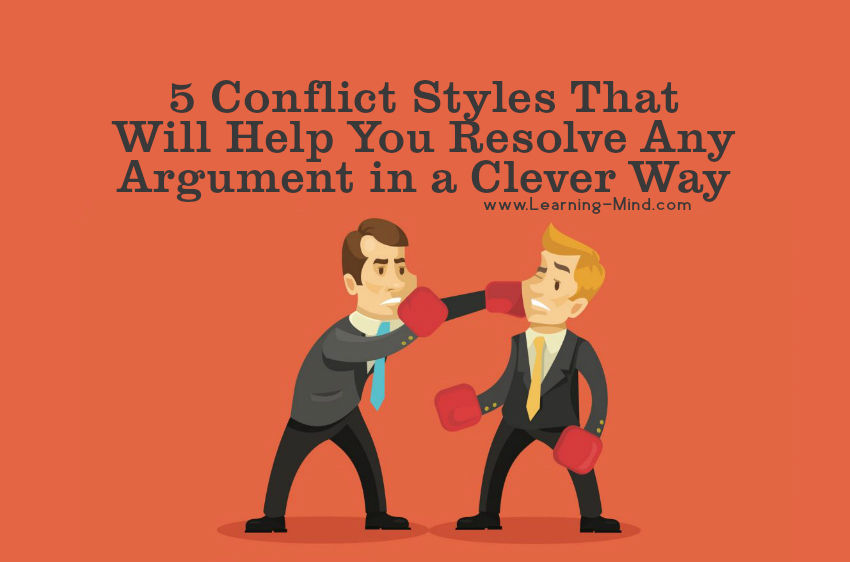
There are five different conflict styles and each has its own advantages and uses. Let’s find out how they can help you resolve any conflict.
There are many types of arguments: ones that have been brewing for years, others that arise out of nowhere, and some that are resolved within minutes. Being aware of the different conflict styles and using this knowledge in practice can help in both your personal and professional life.Experts believe that there are 5 different kinds of conflict styles:
- Avoidance
- Accommodating
- Collaborating
- Competing
- Compromising
Understanding when to use a particular conflict style will help you resolve any argument in the best possible way.
So the first stage in deciding which conflict style to use is to look at each one in detail:
1. Avoidance
Avoiding or withdrawing from an argument is the easiest way of resolving an argument as you are literally taking yourself out of the equation. You either ignore the conflict or pretend it is not happening. It does not require any effort from you apart from a particularly relaxed and laissez-faire attitude.When to use avoidance
Avoidance works best for trivial issues or ones where you have absolutely no chance of winning. This way you can back out gracefully and save your dignity. Avoidance is also best when you are dealing with a costly issue or the atmosphere is quite heated. Withdrawing politely creates much-needed space for both parties to cool down.Generally speaking, these types of conflicts will normally resolve themselves without much input from you, so avoidance in these cases is a good tactic. However, for more serious or emotional conflicts, avoidance is not a good long-term solution.
2. Accommodating
Accommodating is where you accept the other person’s point of view and cooperate with their decisions. In these types of conflicts, you are the person that is doing all of the acknowledging and accepting. At the same time, you should be careful that by doing this, you don’t become resentful.When to use accommodation
In conflicts where it is important to make the peace and move on quickly, accommodation is a great tactic. You might lose some ground and actually have to put your own goals on a back-burner. However, when the other party is an expert or simply has a better idea than you, accommodating is a proven way forward. It is also useful for keeping good relations going with that person or company for the future.3. Collaborating
You need a great deal of courage and self-esteem when it comes to collaborating with the other person. This is because you are required to listen to their point of view, discuss where you agree and disagree and then decide how you are going to both move forward. Collaborating with the other side is a creative process and is one of the best ways of resolving an argument.When to use collaboration
Any complex argument where an instant resolution is not possible benefits greatly from collaboration. Any argument where you could do with a novel solution or extended dialogue is best resolved with collaboration. You do need to be able to trust the other person as collaboration takes effort and can be time-consuming.4. Competing
This is where you stand your ground and don’t accept what the other party is suggesting or proposing. Here you are competing for the best solution and you’ll do anything it takes to win the argument. This can be beneficial for some issues in the short-term but should not be used for any long-term conflicts.When to use competing
You have to be aware that by competing, you are not taking into account the other person’s feelings and this could be your downfall. But it does work well in conflicts where you need a very fast decision, in emergencies where a swift decision is necessary or where someone has to be decisive.5. Compromising
Possibly the best way to resolve any conflict is to compromise. This is where both parties come together and take steps to resolve an argument where you each can have a good outcome. Typically, larger issues are dealt with and smaller issues are forgotten about.When to use compromising
Whenever you require a temporary solution or one where both sides have equally important issues, compromising is a great solution. Both parties require some degree of self-esteem and assertiveness. You can fall into a trap of compromising on issues that are too important for you. So it is important to work out with the other person what you are prepared to compromise on and what you cannot.Knowing which of these conflict styles to use when you are in the middle of an argument means that you can instantly choose the best one to deal with that type of conflict, at the time it happens.
References:
- http://www.wright.edu
- https://www.thebalance.com
Thanks to: https://www.learning-mind.com






 Sat Mar 23, 2024 11:33 pm by globalturbo
Sat Mar 23, 2024 11:33 pm by globalturbo

